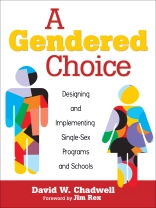‘Chadwell′s book is a very useful guide for principals and administrators seeking to launch single-gender programs.’
—Leonard Sax, Executive Director
National Association for Single Sex Public Education
‘Any administrator following the process outlined in this book will impress teachers, parents and the board with their well thought out approach.’
—Kathy Tritz- Rhodes, Principal
Marcus-Meriden-Cleghorn Schools
Marcus and Cleghorn, IA
‘A thoughtful text and practical guide for educators who are considering establishing single-gendered classrooms.’
—Pedro A. Noguera, Professor, New York University
Executive Director, Metropolitan Center for Urban Education
A comprehensive road map for single-gender initiatives!
Over 400 public schools in the United States offer single-gender classes or programs, and the number of schools contemplating such initiatives is growing at a rapid pace. In this book, David W. Chadwell, the first state coordinator for single-gender programs, offers a step-by-step process with practical planning tools for implementing high-quality single-sex programs and schools.
Organized into three sections—designing, initiating, and sustaining single-gender initiatives in local school sites and districts —this resource includes detailed, essential information on:
- Restructuring to accommodate single-gender classes
- Communicating with parents and overcoming resistance
- Understanding relevant legal issues
- Facilitating instructional changes
- Creating a 1- to 3-year plan
Featuring numerous vignettes, current demographic data, and critical insights for professional development, A Gendered Choice provides everything educators need to know about creating single-gender schools or programs.
Зміст
List of Tables
Foreword
Preface
Acknowledgments
About the Author
Introduction: Defining Single-Gender Education
Part I. Considering Single-Gender Education
1. Gender Makes a Difference in the Classroom
Starting Point: Examining Gender Influences
Student Performance
Social Differences
Hormonal Differences
Brain Differences
Gender Is an Issue
Chapter One Planning Tool: Reflecting on Gender
2. What We Know About Single-Gender Programs
Demographic Data
Achievement and Other Data
Chapter Two Planning Tool: Using Data
3. Political Opposition to Single-Gender Education
The Legal Context of Single-Gender Education
Positions Against Single-Sex Education
Parting Words
Chapter Three Planning Tool: Debating Single-Gender Education
4. Frequently Asked Questions: Concerns and Options
Questions About Socialization
Questions About Planning
Questions About Instruction
Chapter 4 Planning Tool: Clearing Roadblocks
PART II. Designing A Single Gender Program
5. Rationale and Structure
Involve Key Stakeholders: Create an Exploratory Group
Learn Together About Single-Gender Education
Align the Program With the School’s Mission Statement
Develop a Rationale: Look at School Data
Decide on a Structure
Chapter 5 Planning Tool: Developing Rationale and Structure
6. Legal Issues and Logistics
Meeting the Federal Regulations for Single-Gender Programs
Single-Sex Schools
Creating a Master Schedule
Chapter 6 Planning Tool: Examining Legal Boundaries and Schedule Restraints
7. Communication
Communication With Principals and School Administrators
Communication With Teachers
Communication With Parents
Communication With Students
Communication With School Board Members
Order of Concerns in Communicating With Each Group
Avoiding Stereotypes
Chapter 7 Planning Tool: Preparing for Communication
8. Building Community
Integration of Single-Gender Programs Into School Culture
Identity of the Single-Gender Program
Location of Single-Gender Classes
Program Creed
Public Relations Plan
Coordinator for the Single-Gender Program
Team Building for Students
Chapter 8 Planning Tool: Creating Community
9. Program Price
Low-Cost Options
Moderate-Cost Options
High-Cost Options
Chapter 9 Planning Tool: Budgeting and the Impact of Gender
PART III. IMPLEMENTING A SINGLE-GENDER PROGRAM
10. Professional Development
Professional Development Opportunities Prior to Implementation
Possible Timelines to Prepare Teachers Prior to Implementation
Continued Professional Development After Implementation
Timeline to Support Teachers After Implementation
Chapter 10 Planning Tool: Developing a Professional Development Plan
11. Program Evaluation
Ensuring Nondiscrimination
Reviewing the Rationale: Format
Reviewing the Data: Indicators
An Ongoing Review Process
Chapter 11 Planning Tool: Preparing for Evaluation
12. Sustaining a Single-Gender Program
Strong Principal Leadership
Institutionalize the Single-Gender Program
Keep the Program Manageable
Agree on Strategies to Use With Boys and Girls
Mentor New Teachers
Continue Professional Development
Instituting Change
Chapter 12 Planning Tool: Sustaining Change
REPRODUCIBLE RESOURCES
Resource A: Sample Creeds From Single-Sex Schools
Resource B: Sample Proposal Form for Creating a Single-Gender Program
Resource C: Sample Team-Building Activities for Students
Resource D: Organizations for the Learning of Boys and Girls
Resource E: Sample Annual Single-Gender Program Review Form
Resource F: Sample Letter to Parents to Survey Their Interest
Resource G: Sample Letter to Parents Informing Them of Single-Gender Program and Surveying Their Interest
Resource H: Sample Letter to Parents (School Selecting Students With Coed Option Explained)
Resource I: Sample Letter to Parents (All Students in Single-Gender With Coed Option Explained)
References
Index
Про автора
David Chadwell is the coordinator for Single-Gender Initiatives within the South Carolina Department of Education. He works with schools across the state at all stages of implementing single-gender programs. He is also a consultant to principals across the country as they work to create single-gender programs and train their teachers. His comments on single-gender education have appeared in multiple media sources, including MSNBC, ABCNews Online, New York Times Magazine, Education Week, Education Next, USA Today, National Association of Elementary School Principals, and multiple state and local newspapers. In 2004 he helped start the first all-day middle school single-gender program in South Carolina. His career in education has taken him from a private Quaker school in Philadelphia, PA, to an international school in Tianjin, China, to public schools in Columbia, SC. He received his master’s degree in teaching from the University of South Carolina and his master’s degree in philosophy and social policy from The American University.












